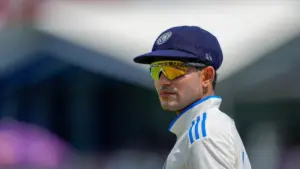Shubman Gill becomes India’s youngest Test captain in England post 2000 so he breaks Kohli and Pataudi’s records. A new era of leadership begins in the Anderson Tendulkar Trophy.
A New Era Begins at Leeds

Friday’s first Test between India and England wasn’t just the start of a five match series but it was the beginning of a historic chapter in Indian cricket. Rohit Sharma said goodbye to the Test format so Shubman Gill walked in as the new captain and straight into the record books. The 25 year old led India for the first time in red ball cricket and it marked a generational shift in leadership.
Gill Dethrones Kohli in Youth Record

By leading India at just 25 years and 285 days Gill went past Virat Kohli’s mark of 26 years and 34 days when he first captained in 2014 against Australia. Gill is now the youngest Indian Test captain in the 21st century and that title had been held by Kohli for over a decade. And it wasn’t just Virat so he also outpaced legends like MS Dhoni and Sehwag on the young captain charts.
Breaking Pataudi’s 57-Year-Old English Record
This wasn’t only a personal record for Gill but it shattered a 57-year-old benchmark as he became the youngest Indian to captain a Test match in England. Not since Nawab Mansoor Ali Khan Pataudi’s trailblazing days had Indian cricket seen someone this young leading on English soil. It’s poetic that this transition happened during the inaugural Anderson Tendulkar Trophy and England’s Ben Stokes chose to bowl first after winning the toss.
Debuts and Comebacks Light Up the XI
The match also saw the debut of left hander B Sai Sudharsan and seasoned players like Karun Nair and Shardul Thakur made their return to the Test side. All eyes were on Gill so not just as a batter but as the face of a new era.
From Future Star to Present Day Leader
Gill had already led India in T20s but this Test series shows a deeper evolution and one from promise to responsibility. He stood tall under cloudy skies at Leeds as he led the team onto the field and it wasn’t just about one game. It was about writing his chapter on Indian cricket’s growing legacy.



